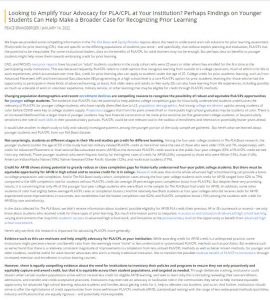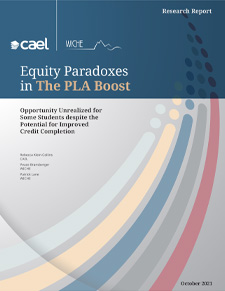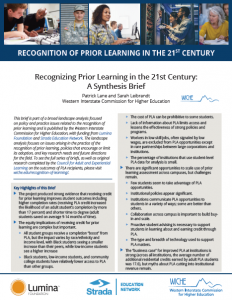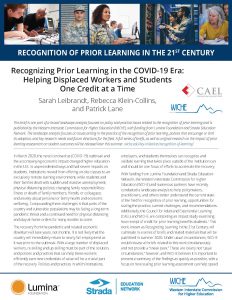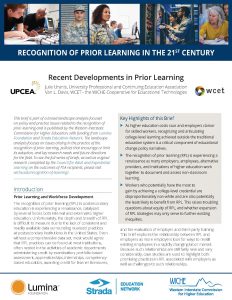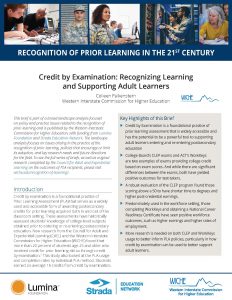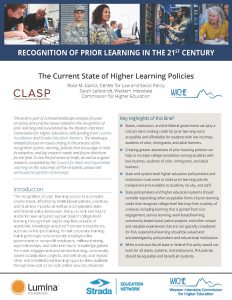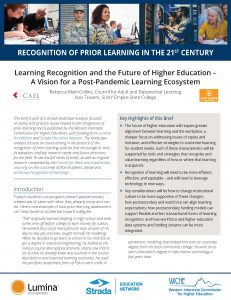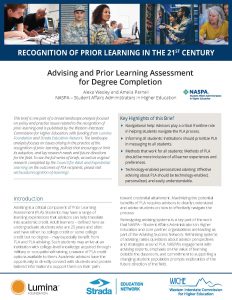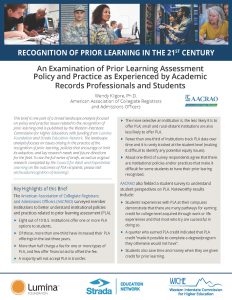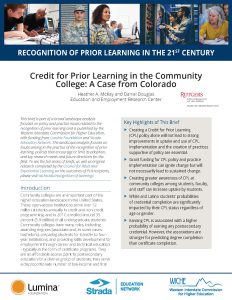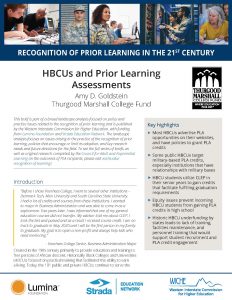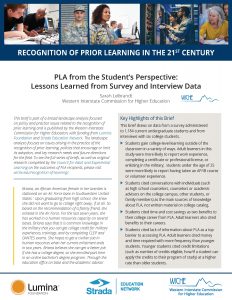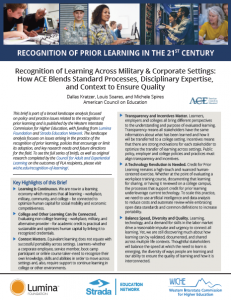Recognition of Learning
WICHE partnered with several organizations from 2018-2020 to conduct a broad landscape analysis and original research related to the recognition of prior learning. This initiative was made possible through generous funding from Lumina Foundation and Strada Education Network. The research from the initiative and additional ongoing research are organized below.
2024 CPL Equity Award Winners
The Council for Adult and Experiential Learning (CAEL) and WICHE announced the inaugural winners of the Credit for Prior Learning (CPL) Equity Awards, recognizing strategies that have been proven to put CPL in reach of key adult learner populations and/or increase their CPL credit-earning. Download the report or learn more here.

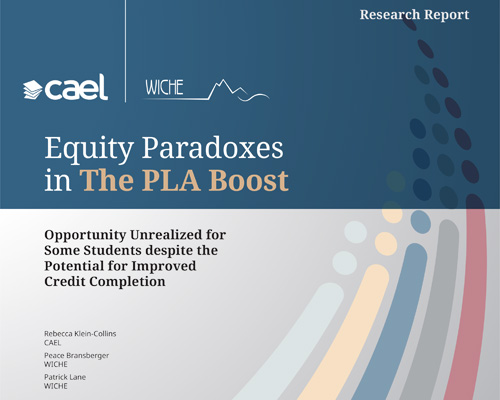
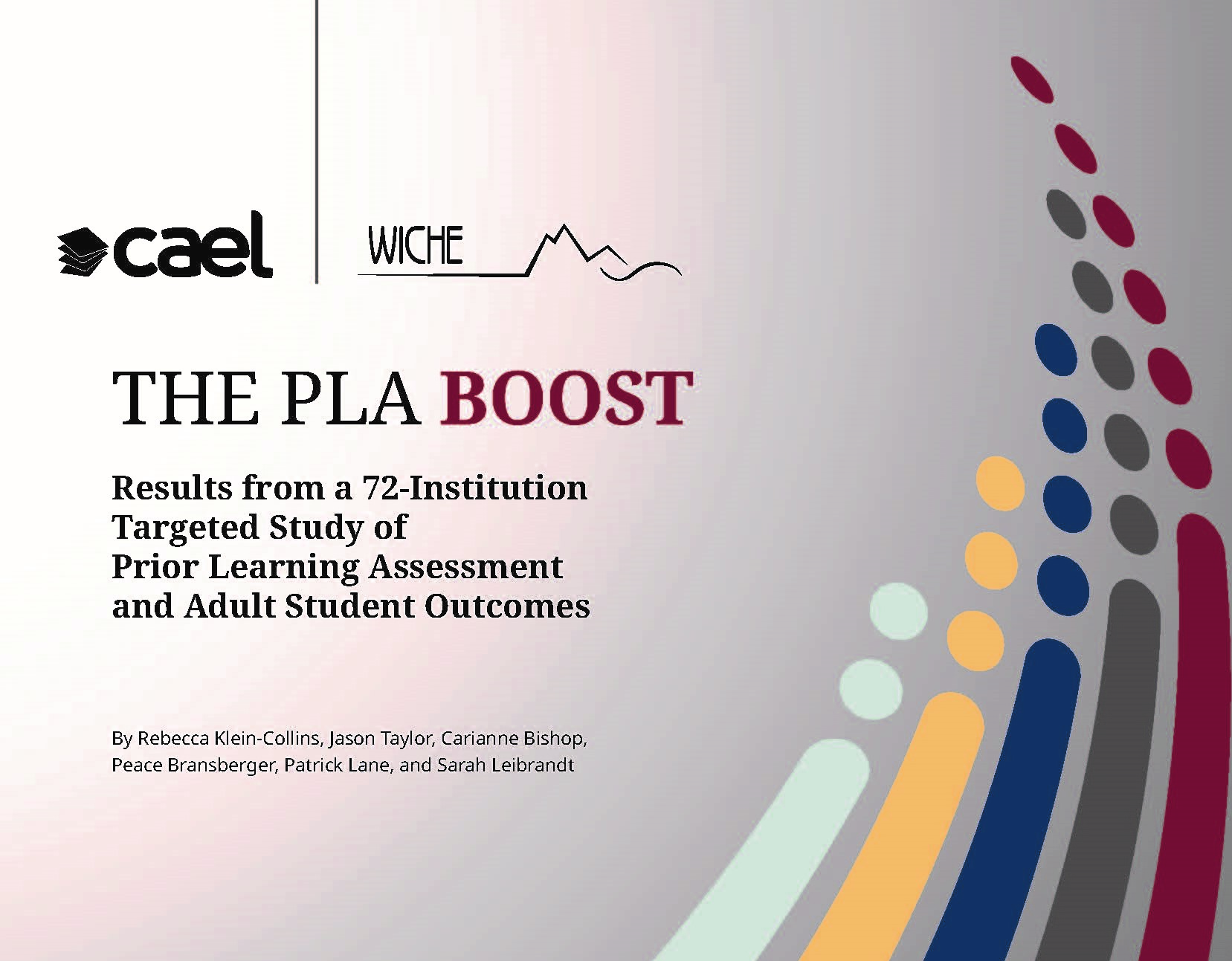
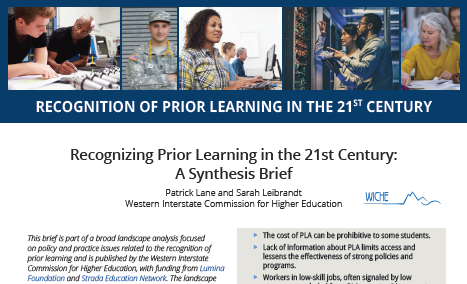
Winners of the Inaugural 2024 CAEL-WICHE Credit for Prior Learning Equity Awards and Their Lessons for the Field
Opportunity Unrealized for Some Students despite the Potential for Improved Credit Completion
The PLA Boost: Results from a 72-Institution Targeted Study of Prior Learning Assessment and Adult Student Outcomes
A series of briefs, reports, and actionable toolkits about prior learning policies and practices.
- Closing Equity Gaps in Credit for Prior Learning
- Equity Paradoxes in The PLA Boost
- PLA Boost Report
- Landscape Briefs
Results from CAEL and WICHE’s 72-Institution Research Study
As part of this initiative, WICHE and the Council for Adult and Experiential Learning (CAEL) collaborated with more than 70 institutions to research the impact of prior learning assessment (PLA) on adult student outcomes. From data on more than 230,000 adult students, key findings of the 2020 PLA Boost report were:
PLA Boosts Credential Completion Rates for Adult Students
17% Increase in completion rate for adult students when controlling for other factors (and Hispanic, Community College and Pell Grant students saw ever greater completion rates).
PLA Saves Adult Students Time and Money
$1,500 to $10,200 Estimated adult student savings through PLA, depending on sector.
9 to 14 Months Estimated adult student time savings in earning degrees, with 12 or more PLA credits.
Institutions Also Benefit through Better Retention
17.6 Additional credits earned by students with PLA compared to non-PLA students.
A Focus on Equity Needs to Be Central to PLA Policies and Practices
In the main PLA Boost study, we found that only 11 percent of students in the sample earned PLA credits and the rates were far lower for Black students and students from low-income backgrounds.
It is critically important to ensure there is better access to PLA (and other ways to recognize college-level learning from work and life experience) among adult students who have not traditionally had strong access to these programs. In a new brief, Equity Paradoxes in The PLA Boost, we provide a deeper look into these lower rates and offer specific recommendations for intentional design of policies and practices that prioritize equity in the design of PLA/CPL programs.
Blog: PLA Advocacy, Younger Students & Equity
January 14, 2022
WICHE blog about the need for a strong focus on equity in prior learning opportunities and how the value proposition of PLA for younger students, as well as adult students, can help make a broader case for recognizing prior learning.
Learn MoreEquity Paradoxes in The PLA Boost
Written by Rebecca Klein-Collins, Peace Bransberger and Patrick Lane
October 13, 2021
This brief provides a deeper look into the finding from The PLA Boost main study that PLA credit receipt was particularly lower for Black adult students and students from low-income backgrounds and offers specific recommendations for intentional design of policies and practices that prioritize equity in the design of PLA/CPL programs.
SnapshotDownload PDFRecognizing Prior Learning in the 21st Century: A Synthesis Brief
Written by Patrick Lane and Sarah Leibrandt, WICHE – Western Interstate Commission for Higher Education
February 9, 2021
This brief is part of a broad landscape analysis focused on policy and practice issues related to the recognition of prior learning and is published by the Western Interstate Commission for Higher Education, with funding from Lumina Foundation and Strada Education Network. The landscape analysis focuses on issues arising in the practice of the recognition of prior learning, policies that encourage or limit its adoption, and key research needs and future directions for the field.
Learn MoreDownload PDFRecognizing Prior Learning in the COVID-19 Era: Helping Displaced Workers and Students One Credit at a Time
Written by: Sarah Leibrandt and Patrick Lane of WICHE and Rebecca Klein-Collins of the Council for Adult and Experiential Learning
June 6, 2020
In March 2020, the novel coronavirus, COVID-19, and the accompanying economic impact changed higher education in the U.S. in unprecedented ways and had severe impacts on students. This brief summarizes some of the key findings from WICHE's Recognition of Learning initiative and synthesizes recommendations from this work that practitioners and policymakers focused on postsecondary education and/or workforce development might consider as discussion moves toward recovery from the COVID-19 pandemic. As this brief argues, fair and equitable recognition of prior learning is one tool among many that higher education can use during this unprecedented time to help more students and displaced workers earn valuable credentials, saving time and money in the process.
Learn MoreDownload PDFRecent Developments in Prior Learning
Written by: Julie Uranis, University Professional and Continuing Education Association and Van L. Davis, WCET – the WICHE Cooperative for Educational Technologies
November 10, 2020
This brief explores the relationship between the recognition of prior learning and employers as more employers look for ways to reskill existing employees in a rapidly changing labor market. Because such relationships are still fairly new and vary considerably, three case studies are used to highlight both promising practices in RPL associated with employers as well as challenges to such relationships.
Learn MoreDownload PDFCredit by Examination: Recognizing Learning and Supporting Adult Learners
Written by: Colleen Falkenstern, Western Interstate Commission for Higher Education
November 10, 2020
Credit by Examination is a foundational practice of prior learning assessment that is widely accessible and has the potential to be a powerful tool to supporting adult learners entering and re-entering postsecondary education. WICHE conducted a meta-analysis of existing literature to understand the impact CLEP and WorkKeys, two types of credit-by-examination, can have on student success. A robust evaluation of the CLEP program found those scoring above a 50 to have shorter time to degrees and higher post-credential earnings. Predominately used in the workforce setting, those completing WorkKeys and obtaining a National Career Readiness Certificate have seen positive workforce outcomes, such as higher earnings and higher rates of employment. More research is needed on both CLEP and WorkKeys usage to better inform PLA policies, particularly in how credit by examination can be used to better support adult learners.
Learn MoreDownload PDFThe Current State of Prior Learning Policies
Written by: Rosa M. García, Center for Law and Social Policy and Sarah Leibrandt, Western Interstate Commission for Higher Education
November 20, 2020
This brief investigates the critical role states, accrediting bodies, and the federal government can play in making credit for prior learning more accessible and affordable for students with low incomes, students of color, immigrants, and adult learners.
Learn MoreDownload PDFLearning Recognition and the Future of Higher Education – A Vision for a Post-Pandemic Learning Ecosystem
Written by: Rebecca Klein-Collins, Council for Adult and Experiential Learning and Nan Travers, SUNY Empire State College
September 10, 2020
The authors of this brief conducted conversations with several leaders of change within the higher education landscape. Drawing on these conversations, the authors suggest what a future higher education model could - and should - look like in order to reflect the realities of the changing world of work post-COVID while taking advantage of advances in technology-based tools and our growing understanding of how people learn.
Learn MoreDownload PDFAdvising and Prior Learning Assessment for Degree Completion
Written by: Alexa Wesley and Amelia Parnell of NASPA-Student Affairs Administrators in Higher Education
August 27, 2020
To examine the conditions around advising students about Prior Learning Assessment (PLA) and the current state of the field, NASPA conducted a research study involving video and phone interviews with practitioners in advising-related roles at institutions and a national survey of student affairs professionals. This brief shares findings and recommendations from this research.
Learn MoreDownload PDFAn Examination of Prior Learning Assessment Policy and Practice as Experienced by Academic Records Professionals and Students
Written by: Wendy Kilgore of the American Association of Collegiate Registrars and Admissions Officers
July 14, 2020
The American Association of Collegiate Registrars and Admissions Officers (AACRAO) surveyed member institutions to better understand institutional policies and practices related to prior learning assessment (PLA) and fielded a student survey to understand student perspectives on PLA. This brief shares findings and recommendations from this research.
Learn MoreDownload PDFCredit for Prior Learning in the Community College: A Case from Colorado
Written by: Heather A. McKay and Daniel Douglas, Education and Employment Research Center
October 29, 2020
The Education and Employment Research Center conducted a case study of the colleges in the Colorado Community College System to better understand the impact of grant funding on credit for prior learning (CPL) policy and practice implementation. Grant funding for CPL policy and practice implementation can ignite change but will not necessarily lead to sustained change. Creating greater awareness of CPL at community colleges among students, faculty, and staff can increase uptake by students.
Learn MoreDownload PDFHBCUs and Prior Learning Assessments
Written by: Amy D. Goldstein, Thurgood Marshall College Fund
October 15, 2020
This brief explores the ways in which HBCUs acknowledge and award postsecondary credit to students for college-level learning that took place outside of the institution as a way to improve student outcomes. Thurgood Marshall College Fund undertook research that reviewed information publicly available regarding PLA policies and information on HBCU websites and engaged in a more in-depth case study analysis of four targeted HBCUs, each of which represents a distinct type of institution. This brief concludes with recommendations for policy and practice with regard to HBCUs and other institutions facing similar resource constraints.
Learn MoreDownload PDFPLA from the Student’s Perspective: Lessons Learned from Survey and Interview Data
Written by: Sarah Leibrandt, Western Interstate Commission for Higher Education
December 2, 2020
This brief draws on data from a survey administered to 1,184 current college students and from interviews with six college students to better understand how students access (or not) opportunities to earn credit for prior learning. Lack of information about PLA was cited as a top barrier to accessing PLA. For those students that did access PLA, students cited conversations about PLA with individuals (such as academic advisors on the college campus, other students, or family members) as being most influential. The brief concludes with recommendations from students themselves on how institutions can improve their PLA programs and policies.
Learn MoreDownload PDFRecognition of Learning Across Military and Corporate Settings
Written by Dallas Kratzer, Louis Soares, and Michele Spires
February 9, 2021
This brief is part of a broad landscape analysis on policy and practice issues related to the recognition of prior learning and is published by the Western Interstate Commission for Higher Education (WICHE), with funding from Lumina Foundation and Strada Education Network. The landscape analysis focuses on issues arising in the practice of the recognition of prior learning, policies that encourage or limit its adoption, and key research needs and future directions for the field.
Learn MoreDownload PDFRecent Presentations
December 10, 2020: Lumina Recognition of Learning Convening
Making the Case for the Recognition of Learning: Evidence from the Field to Scale Effective Practices & Policies
During this webinar, CAEL and WICHE shared key findings and data that show how PLA benefits both students and institutions alike.

November 5, 2020: CAEL 2020 Conference Session
Prior Learning Assessment: the Impact for Today’s Students and the Importance for Tomorrow’s
During this conference session, WICHE gave an overview of the landscape analysis and several partners presented on their research on the following topics: PLA advising practices on campus, PLA policies at the state and system level, and the future of PLA.
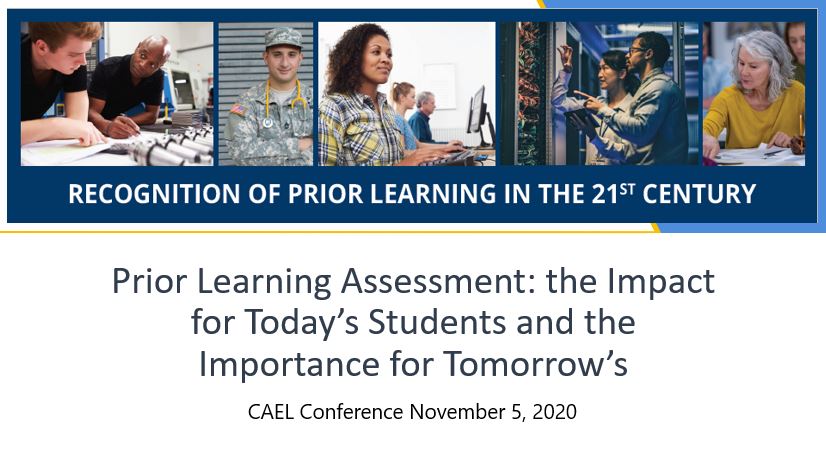
October 22, 2020: CAEL and WICHE Webinar
The PLA Boost: Results from a 72-Institution Targeted Study of Prior Learning Assessment and Adult Student Outcomes
During this webinar, WICHE and CAEL introduced findings from The PLA Boost. Several institutions from the study joined WICHE and CAEL to discuss the implications of these findings.

July 15, 2020: AACRAO and WICHE Presentation
Two Perspectives on Prior Learning Assessment and Student Success
During this Webinar, WICHE gave an overview of the landscape analysis and AACRAO presented on its research as part of the landscape analysis.
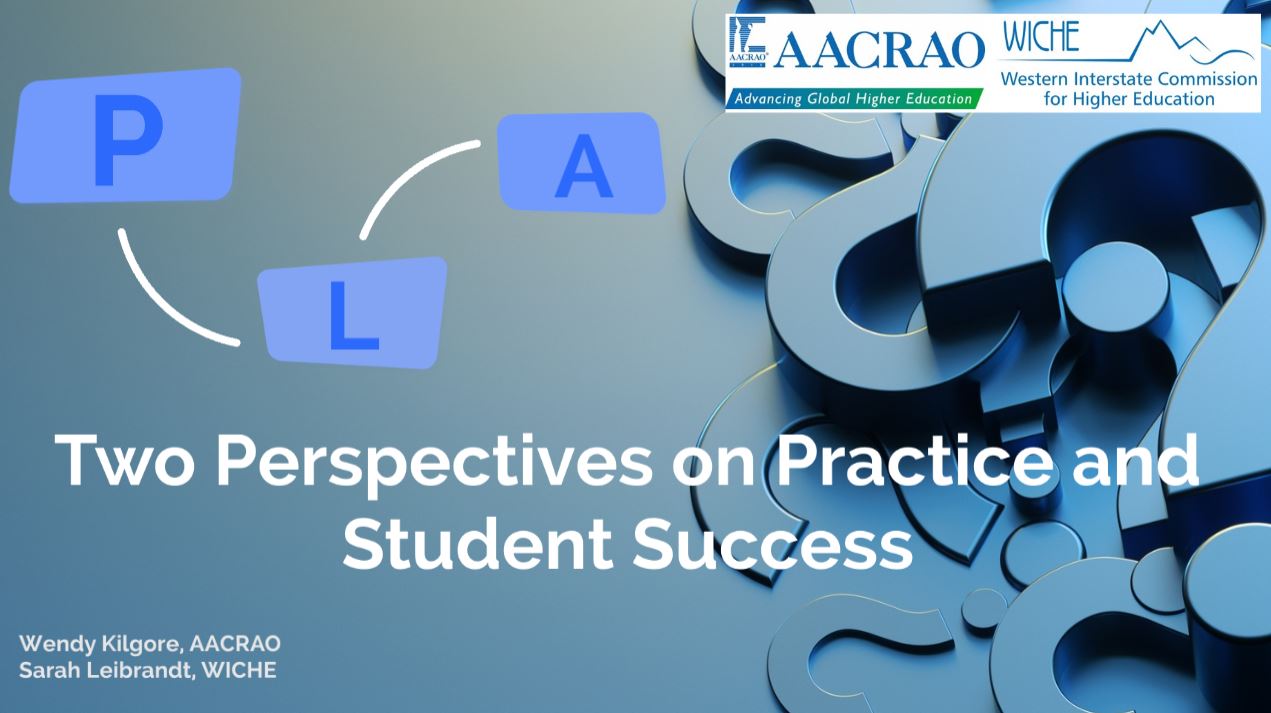
For questions, please contact:
Patrick Lane
Vice President, Policy Analysis and Research
Patrick Lane is the Vice President of WICHE’s Policy Analysis and Research unit. In this role, he oversees a range of work focused on improving access to and excellence in postsecondary education through sound public policy and research. This portfolio of work includes efforts to improve the value of postsecondary education, address students’ behavioral health needs, increase affordability, and ensure robust regional collaboration. He previously was WICHE’s director of data initiatives leading efforts to improve linkages between state data systems. Prior to this role, he coordinated WICHE’s efforts on adult learners and improving postsecondary access for low-income students. He came to WICHE after spending several years working in education policy in the Republic of the Marshall Islands. Lane completed a doctorate in public affairs at the University of Colorado Denver in 2015.

